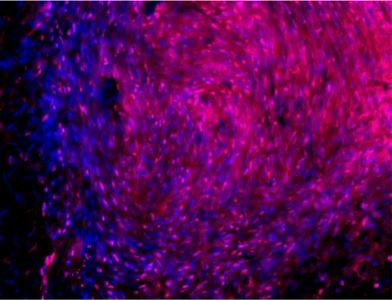 Neural stem cells pre-treated with metformin integrate into the brain and give rise to new neurons. Transplanted neural stem cells and their daughter cells are shown in red in this section of rat brain. Photo by Fares Ould-brahim in Dr. Jing Wang’s group, reproduced courtesy of the journal Stem Cells and Development, published by Mary Ann Liebert, Inc., New Rochelle, NY.Imagine removing blood or skin cells from a patient after a stroke, turning them into powerful stem cells in the lab, and then transplanting them back into the same patient’s brain so they can give rise to new neurons to repair the damage. This is the promise of induced pluripotent stem cell (iPSC) technology, and new research led by Dr. Jing Wang could help make it a reality. Dr. Wang and her team discovered that metformin, an established diabetes drug, can stimulate neural stem cells derived from iPSCs, helping them integrate into the brain and give rise to more neurons. In a stroke model, animals that received metformin-treated neural stem cells showed signs of increased regeneration in the brain and had faster recovery of gross motor skills compared to animals that received untreated cells. Future research will examine if other combinations of stem cells and drugs could be even better. See Stem Cells and Development for details.
Neural stem cells pre-treated with metformin integrate into the brain and give rise to new neurons. Transplanted neural stem cells and their daughter cells are shown in red in this section of rat brain. Photo by Fares Ould-brahim in Dr. Jing Wang’s group, reproduced courtesy of the journal Stem Cells and Development, published by Mary Ann Liebert, Inc., New Rochelle, NY.Imagine removing blood or skin cells from a patient after a stroke, turning them into powerful stem cells in the lab, and then transplanting them back into the same patient’s brain so they can give rise to new neurons to repair the damage. This is the promise of induced pluripotent stem cell (iPSC) technology, and new research led by Dr. Jing Wang could help make it a reality. Dr. Wang and her team discovered that metformin, an established diabetes drug, can stimulate neural stem cells derived from iPSCs, helping them integrate into the brain and give rise to more neurons. In a stroke model, animals that received metformin-treated neural stem cells showed signs of increased regeneration in the brain and had faster recovery of gross motor skills compared to animals that received untreated cells. Future research will examine if other combinations of stem cells and drugs could be even better. See Stem Cells and Development for details.
“Stem cells hold great promise for stroke recovery, but we need more research to optimize them for transplantation into the brain,” said Dr. Jing Wang, scientist at The Ottawa Hospital and assistant professor at the University of Ottawa. “This research is an exciting step forward.”
Authors: Ould-Brahim F, Sarma S, Syal C, Lu K, Seegobin M, Carter A, Jeffers M, Doré C, Stanford W, Corbett D, Wang J.
Core Resources: Human Pluripotent Stem Cell Facility
Funders: Dr. Wang’s research is possible because of generous donations to research at The Ottawa Hospital. This project was also supported by the Heart and Stroke Foundation Canadian Partnership for Stroke Recovery.
The Ottawa Hospital: Inspired by research. Driven by compassion
The Ottawa Hospital is one of Canada’s largest learning and research hospitals with over 1,100 beds, approximately 12,000 staff and an annual budget of over $1.2 billion. Our focus on research and learning helps us develop new and innovative ways to treat patients and improve care. As a multi-campus hospital, affiliated with the University of Ottawa, we deliver specialized care to the Eastern Ontario region, but our techniques and research discoveries are adopted around the world. We engage the community at all levels to support our vision for better patient care. See www.ohri.ca for more information about research at The Ottawa Hospital.
University of Ottawa: —A crossroads of cultures and ideas
The University of Ottawa is home to over 50,000 students, faculty and staff, who live, work and study in both French and English. Our campus is a crossroads of cultures and ideas, where bold minds come together to inspire game-changing ideas. We are one of Canada’s top 10 research universities—our professors and researchers explore new approaches to today’s challenges. One of a handful of Canadian universities ranked among the top 200 in the world, we attract exceptional thinkers and welcome diverse perspectives from across the globe. www.uottawa.ca
Media Contact
Jennifer Ganton
Director, Communications and Public Relations
Ottawa Hospital Research Institute
Office: 613-798-5555 x 73325
Cell: 613-614-5253
jganton@ohri.ca
